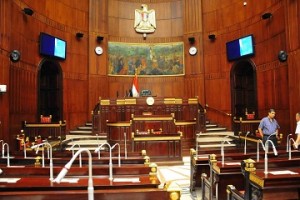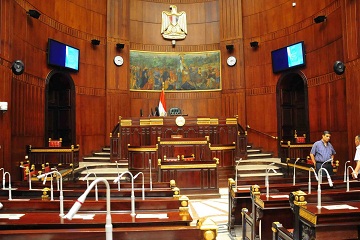
The number of members withdrawing from the Constituent Assembly reached 21 on Monday after the Ghad Al-Thawra Party withdrew all three of its members and the last remaining Wafd member resigned.
Seven reserve members have also resigned, as have the members of the technical advisory committee. Neither groups have voting rights in the assembly, however.
Ghad Al-Thawra leader Ayman Nour announced last week that his party would freeze its seats in the assembly following the withdrawal of several other liberals and leftists, but following President Mohamed Morsy’s constitutional decree on Thursday the party decided to withdraw altogether.
The Wafd party decided to withdraw last week but party member and former People’s Assembly Deputy Spokesperson Abdel-Alim Daoud initially opposed the decision. He withdrew however, following Morsy’s decree.
The assembly is now down to 79 members after most secular members and representatives of Egypt’s three main Coptic Christian churches resigned.
The assembly needs a 67 per cent majority to pass constitutional articles and failing that a 57 per cent majority in second round voting. Islamists make up at least 60 per cent of the 100-member assembly but the internal bylaws require that all members be present for final voting.
Remaining members are currently holding daily meetings to finalise the draft and put it to referendum. They have accused the withdrawing members of trying to sabotage the assembly.
In a press conference last week the assembly’s executive committee said those who withdrew had no grounds to do so and had signed a statement of consensus on some of the articles they now claim to have left over.
The crisis in the assembly intensified following the president’s decree, where, among other things, he declared the assembly could not be reviewed or dissolved by the judiciary. He also extended the December deadline for the final draft by two months.
The assembly is facing an administrative court case that was likely to see it dissolved, as the court dissolved a previous assembly in June on similar grounds as those given in the current dissolution case. Morsy’s decree now seems to ensure its survival, however.
Morsy had promised during his election campaign to restructure the assembly to add more balance but failed to do so.
Opposition members are calling on Morsy to repeal his decree, dissolve the assembly and form a new, more balanced, one.
Remaining members say although they have yet to receive official resignations from the departed members and are urging them to return, they are ready to vote in replacement members from the assembly’s 50-member reserve list.

